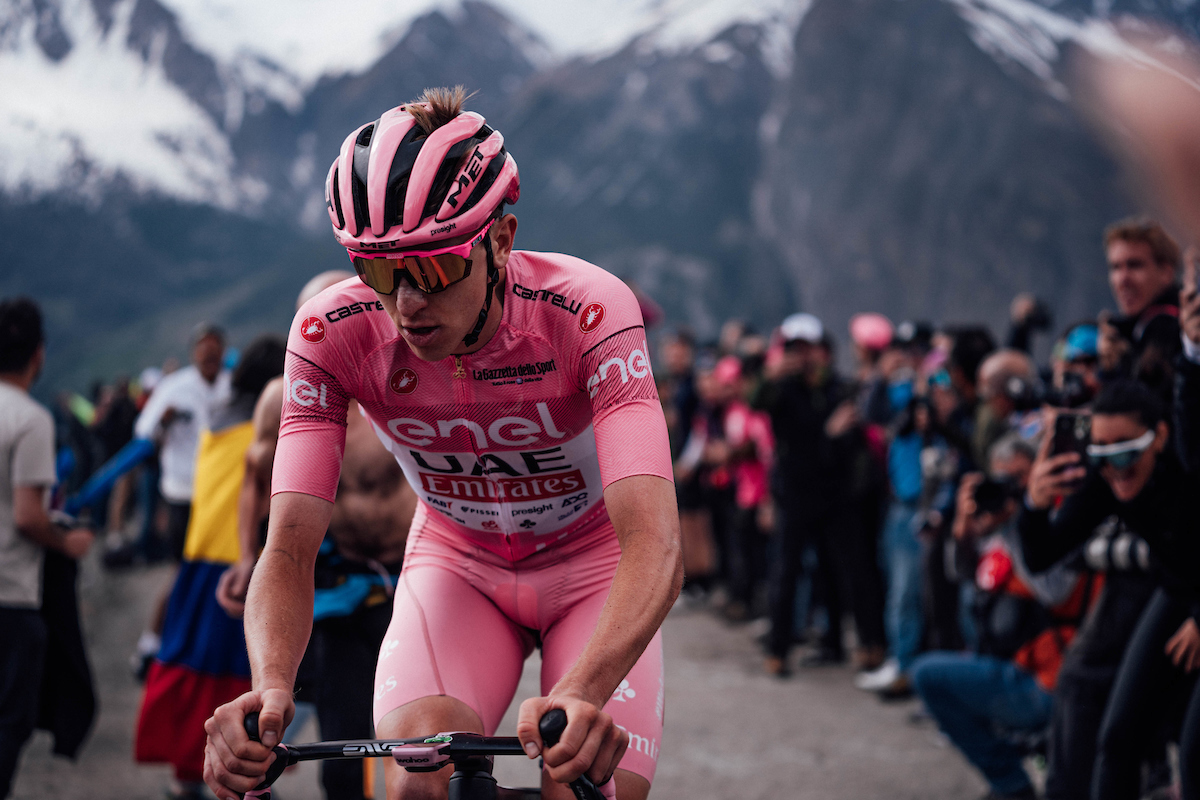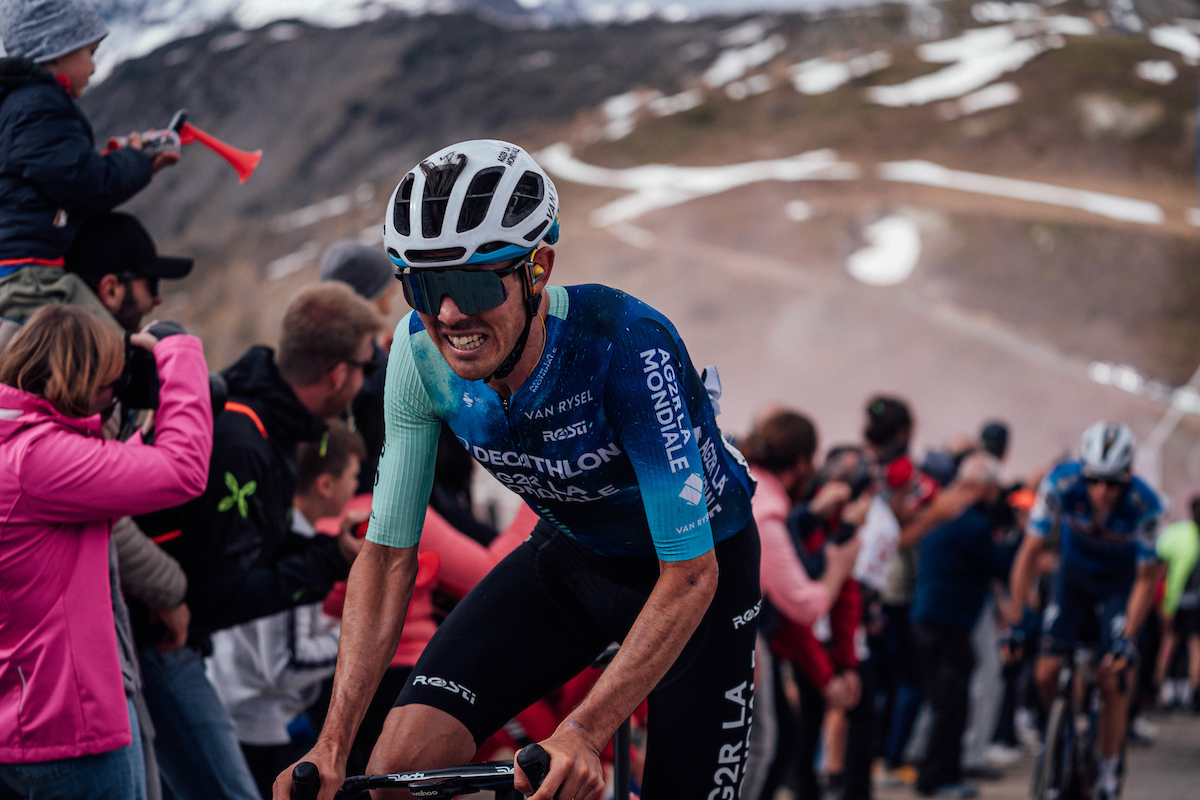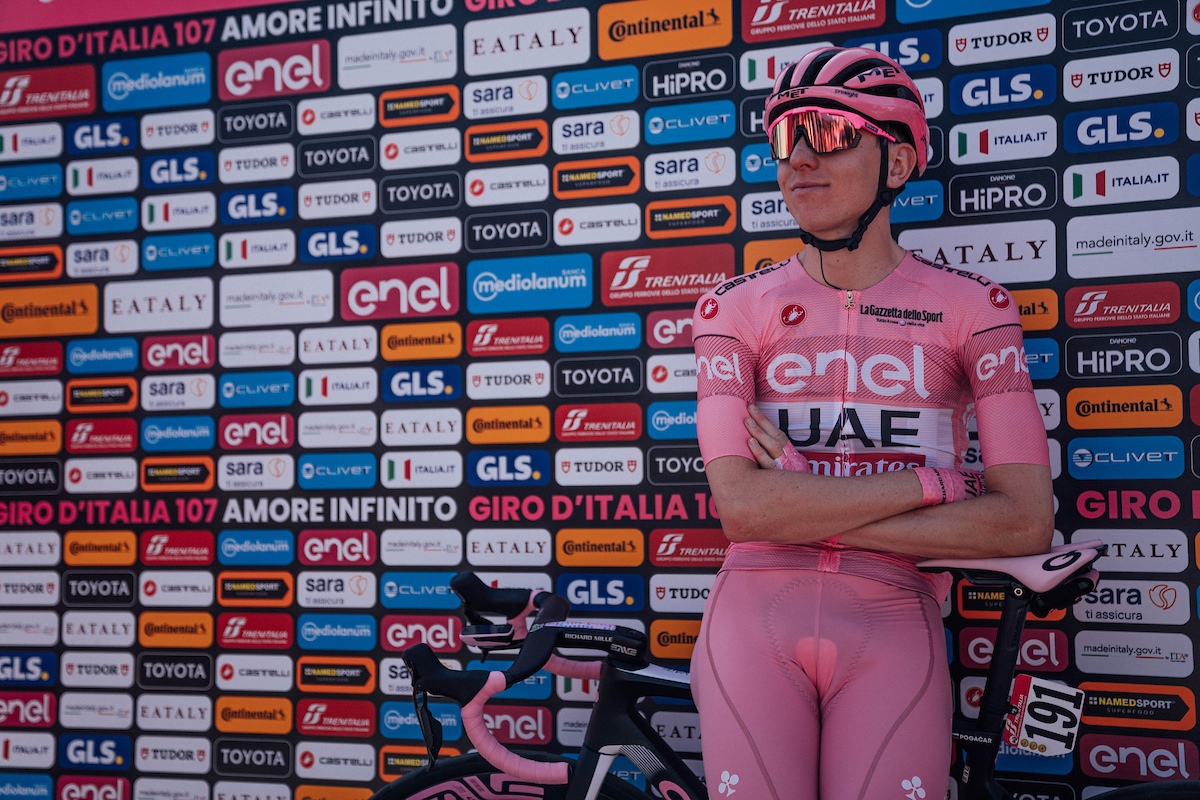‘He’s riding in a different world’ – Tadej Pogačar moves out of sight at the Giro d’Italia
Eyewitness: The view from Livigno as maglia rosa produces most emphatic exhibition yet

In the media tent at the finish line in Livigno, the televisions showing the finale of stage 15 of the Giro d’Italia were devoid of sound, but maybe that was only appropriate. Two weeks into Tadej Pogačar’s domination of this race, what more needed to be said?
When Pogačar attacked out of the select group on the Passo di Foscagno, there was no reaction from his closest competitors, who have long since resigned themselves to the dispiriting fact that the Slovenian is in a race entirely of his own – a race against history perhaps, but primarily a race sheerly for his own amusement.
There was precious little reaction among the journalists and support staff huddled around the television screens beyond the finish line either. Watching Pogačar race this Giro is like spending an entire month in the Uffizi. After a certain point, you become so saturated with masterpieces that even the Birth of Venus ceases to amaze.
There was certainly no triumphalism from UAE Team Emirates sports manager Matxin Joxean Fernandez, who sat in the tent watching events unfold. Earlier in the afternoon, he had smiled and shrugged when somebody asked him when the show would begin. Now, as Pogačar surged clear and opened a gap of almost three minutes on Geraint Thomas et al, Matxin quietly tapped out updates on his mobile phone to the directeurs sportifs in the team cars.
When Pogačar crossed the line and rolled over the crest of the mountaintop, Matxin stepped out of the media tent, but he barely had time to acknowledge the Slovenian before he was swept off again in the direction of the podium. Matxin, meanwhile, was quickly besieged for a live television interview, where he politely tried to insist the Giro wasn’t over just yet. He surely doesn’t believe that himself.
The chasers

Three minutes later, the men who are notionally vying with Pogačar for this Giro spilled across the line in ones and twos, their faces haunted and ashen after a day that featured some 5,300m of climbing, including the Passo Mortirolo and the two-part haul to the finish in Livigno, some 2,385m above sea level.
The thin air at this altitude and the exhaust fumes from the cars and motorbikes of the Giro had also taken their toll. Ben O’Connor (Decathlon-AG2R La Mondiale) was one of many to cross the line coughing heavily. He came home 2:58 down on Pogačar, but his more immediate concern would have been for the eight seconds he lost to Geraint Thomas (Ineos Grenadiers) and Daniel Martínez (Bora-Hansgrohe) on the final ramps of the climb. Their race is for second and third, not the pink jersey. In truth, it’s been that way since Turin.
Get The Leadout Newsletter
The latest race content, interviews, features, reviews and expert buying guides, direct to your inbox!
O’Connor is usually among the peloton’s most affable riders in these situations, but after more than six hours in the saddle, he had little appetite to stop and sample the tumult of this finish area. Rather than talk to reporters at the finish, he preferred to roll directly to the cable car that would take riders to their hotels in the town below. The analysis could wait for Monday’s rest day.
Martínez stopped to accept some additional layers from the Bora-Hansgrohe soigneurs, and a couple of television crews lingered hopefully nearby as he was helped into a jacket, leg warmers and hat. When they eventually stepped forward in the hope of an interview, however, Martínez shook his head and rode off. Perhaps this Giro has already said everything it has to say.
Mercifully, Thomas was willing to put some words on the day from the point of view of the men who had trailed in Pogačar’s wake. Thomas had been shepherded to anti-doping immediately after the finish, but when he emerged, he paused to chat with a group of reporters who had set up camp at the entrance. The Welshman is still second overall, but now 6:41 behind Pogačar, with Martínez at 6:56 and O’Connor at 7:43.
Thomas confirmed what the television images had clearly indicated. He and the rest of the podium contenders hadn’t even considered following Pogačar when he launched his inevitable winning effort. Reacting to that kind of acceleration would have been like trying to shout over a hurricane. It made far more sense to take shelter and speak quietly among themselves.
“He’s riding in a different world,” Thomas admitted. “He could win by five minutes or a minute, our group didn't seem to be bothered. It was about racing each other.”
The only man to try to follow Pogačar at full flight was Attila Valter (Visma-Lease a Bike), who was part of the remnants of the day’s early break. All the other members of the move had deferentially swung over as Pogačar swept by, like lapped cars moving aside on the circuit at Imola.
Valter, a defiant sort, couldn’t resist putting up a show of insubordination, climbing from the saddle and straining to hold Pogačar’s wheel. In truth, it was like the kind of stunt challenge Johnny Knoxville would have set for himself. Valter lasted half a minute or so before relenting.
“I prepared myself to try to follow him, but logically I had to let go again a little later,” Valter said. “It was a good way to test myself.”
The last man to resist Pogačar on Sunday afternoon was Nairo Quintana (Movistar). The Colombian is no longer the rider who soared to Giro victory a decade ago, but this was, by a distance, his best performance he was disqualified from the 2022 Tour de France for testing positive for Tramadol. He warded off Pogačar’s advance until just inside the final 2km, eventually coming home second, 29 seconds down.
On crossing the line, Quintana was submerged in a scrum of microphones and cameras. Once he caught his breath, he summoned up a few perfunctory remarks about the day’s stage until they left him in peace. “It was emotional,” he repeated softly.
On the other side of the road, a group of Colombian fans leant over the barriers, drawing his attention with a familiar chant: “Nai-ro! Nai-ro! Nai-ro!” Quintana smiled and waved as he freewheeled past them towards the cable car. The stage belonged to Pogačar, and so does the Giro, but at least one corner of the mountainside was pure Quintana country.
Rituals

Almost an hour had passed by the time Pogačar had completed the podium ceremony and his duties in the mixed zone. By then, the gruppetto had already made its way through the finish area, and it was refreshing to see that even in this era of careful calibration, gallows humour remains a key tool in the armoury of a man hellbent on finishing the Giro. When they wheeled to a halt, one rider nudged his neighbour and pointed to the mountainside above them, still white with snow. “We should have finished up there,” he deadpanned.
For Pogačar, meanwhile, the last daily ritual was to meet with the written press, but he was beginning to flag a little as he climbed the steps into the press conference truck. “Haribo,” he murmured to UAE Team Emirates press officer Luke Maguire, who in turn mimed the instruction to a soigneur before they stepped in the door.
In the press conference, Pogačar cut a more relaxed figure than he had at any point on this Giro. By the end of the first week, he had appeared increasingly irritable at repeating the same old answers to the same old questions. Now, he was in freewheeling mood as he spoke of a fondness for Livigno that dated back to his days with the Slovenian junior team.
Pogačar and his teammates on that first trip were based across the Swiss border in Saint Moritz, but they drove their creaking van over the border to Livigno to avail of the area’s duty-free status. “We came here to buy gasoline because it’s cheaper,” Pogačar smiled.
From cheap gas to full gas, it’s been an astonishing journey. Pogačar’s exhibition on Sunday has put the Giro even further beyond the reach of Thomas et al, but he downplayed the idea that he would now seek to emulate or surpass a variety of records from the eras of Eddy Merckx and Learco Guerra. “Every Giro has its own story,” he said.
When Pogačar emerged from the press conference truck, a small bag of Haribo was pressed into his hand. Before he could start eating, his attention was drawn to a raucous group of tifosi on the other side of the barriers, where a burly man was shouting his appreciation: “Ti amo, Pogi!” [I love you]. Pogačar smiled as he breezed by, and then called back cheerily: “Ti amo io.” And then he was gone, out of sight. The story of this Giro.

Barry Ryan was Head of Features at Cyclingnews. He has covered professional cycling since 2010, reporting from the Tour de France, Giro d’Italia and events from Argentina to Japan. His writing has appeared in The Independent, Procycling and Cycling Plus. He is the author of The Ascent: Sean Kelly, Stephen Roche and the Rise of Irish Cycling’s Golden Generation, published by Gill Books.